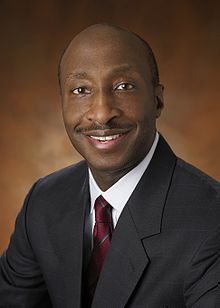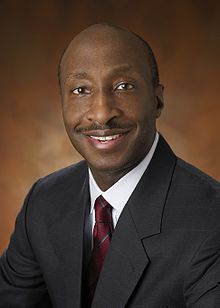

Kenneth C. Frazier, the chief executive of Merck, has a powerful personal story and has built an exceptional career. Raised in a poor neighborhood in Philadelphia, Mr. Frazier attended Penn State University and Harvard Law School. He joined Merck in 1992, defending the company against major lawsuits while resisting calls to slash research and development budgets.
Last year, Mr. Frazier made headlines as the first chief executive to resign from a presidential advisory council following Mr. Trump’s equivocating response to an outburst of white nationalist violence in Charlottesville, Va. As perhaps the most prominent black chief executive in the country, his stance carried powerful symbolism.
The Times published an article last month about Mr. Frazier’s decision to resign from the advisory role. This interview, which was condensed and edited for clarity, was conducted at Merck’s headquarters in Kenilworth, N.J.
You once said that even though your father was a janitor, you believed he could have been a C.E.O.
My father was born in the year 1900 in South Carolina, and he grew up at a time where being an African-American child in the American South was to be deprived of access to anything close to a reasonable education. He only had three years of formal education, but he was self-taught. He read two newspapers a day. He could’ve done a lot of things had he been born when I was born.
Tell me about his father.
My grandfather on my paternal side, Richard Frazier, was born in the late 1850s, and therefore was born into slavery, but was a sharecropper in South Carolina for his entire life. And one of the great things about my grandfather was that he sent my father north before he reached the age of maturity so that he, too, wouldn’t become indebted to the land.
How did your parents raise you?
I had a fantastic upbringing by two parents who cared deeply about their children, but more importantly believed that anything was possible for their children, and in some ways almost brainwashed us to be successful. They believed that despite the history of this country as it related to African-Americans, that for my siblings and I, that there would be tremendous opportunity. They also instilled that it was our responsibility to take advantage of the opportunities that they did not have.
What drew you to the study of law?
I’ve always admired lawyers who use their power to affect social change, and Thurgood Marshall was always a childhood hero of mine.
After graduating from Harvard Law School, you went to work at Drinker Biddle & Reath. Why there?
I chose that firm in large part because they had a reputation of doing a lot of pro bono work. When I was at the firm, I read about the need in South Africa for law professors and lawyers to come from the U.S., because black law students in South Africa were obviously during apartheid only allowed to go to second-rate law schools.
I lived one whole semester in Soweto. It was completely lawless. There were no streetlights. It was a completely separated area where people were contained, because the South African government’s job, as it saw it, was to separate blacks from whites.
But what I remember more than anything else was interacting with people who their entire lives had been told that they were second class, that they were inferior, and how hard it was to get particularly the men to speak up in audible tones, because they had been in many ways told that their voice was not worth listening to. In addition to trying to teach people the substantive legal issues, it was a lot about trying to instill self-confidence.
My first reaction was, “I’m much too busy to take on another piece of pro bono litigation.” But there were two younger lawyers in the firm who heard about the case, and they came to me and frankly they sort of shamed me into doing it.
You eventually won his freedom. What did that mean to you?
It was the high point of my professional career. This is a man who was facing an execution date for a crime he did not commit. And what I will never forget about Bo was that he had no sense of recrimination whatsoever. He was just thankful for every day that he had as a free man. It sort of reminds me of Nelson Mandela in the sense that he was able to live his life going forward without regard to trying to even scores.
One of the things that defined your early years at Merck was the defense against lawsuits over Vioxx, a painkiller that posed heart risk and was pulled off the market. Are there lessons to be learned from the way you approached that?
The central allegation that was underneath the Vioxx litigation was that this company put profit before patient safety. That went to the core of who we are as a company, and there was no way that we could allow that story to be unchallenged. We did not want Vioxx to become a verbal shorthand, like an Enron or something of that nature, for corporate wrongdoing. The most important role of a leader is to safeguard the heritage and values of the company.
How do you balance the pressure to deliver profits to public shareholders and also to make lifesaving drugs?
I actually don’t see that big a conflict between meeting the needs of shareholders and meeting the needs of society.
Very early on in my tenure there was a lot of pressure being put on pharmaceutical C.E.O.s to cut their research budgets. And we value R & D as a company. It’s who we are. It’s the core of what we do. I made the decision that I wasn’t going to cut our R & D budget, and that had some short-term negative consequences in terms of share price. But by taking those actions I think we were able to show that we really did care about what we said we were about as a company.
Last year, after President Trump’s remarks following the violence in Charlottesville, you resigned from one of his advisory councils. What happened?
In that moment the president’s response was one that I felt was not in concordance with my views, and I didn’t think they were in concordance with the views that we claim to hold as a country. It was my view that to not take a stand on this would be viewed as a tacit endorsement of what had happened and what was said. I think words have consequences, and I think actions have consequences. I just felt that as a matter of my own personal conscience, I could not remain.
Read more at New York Times
